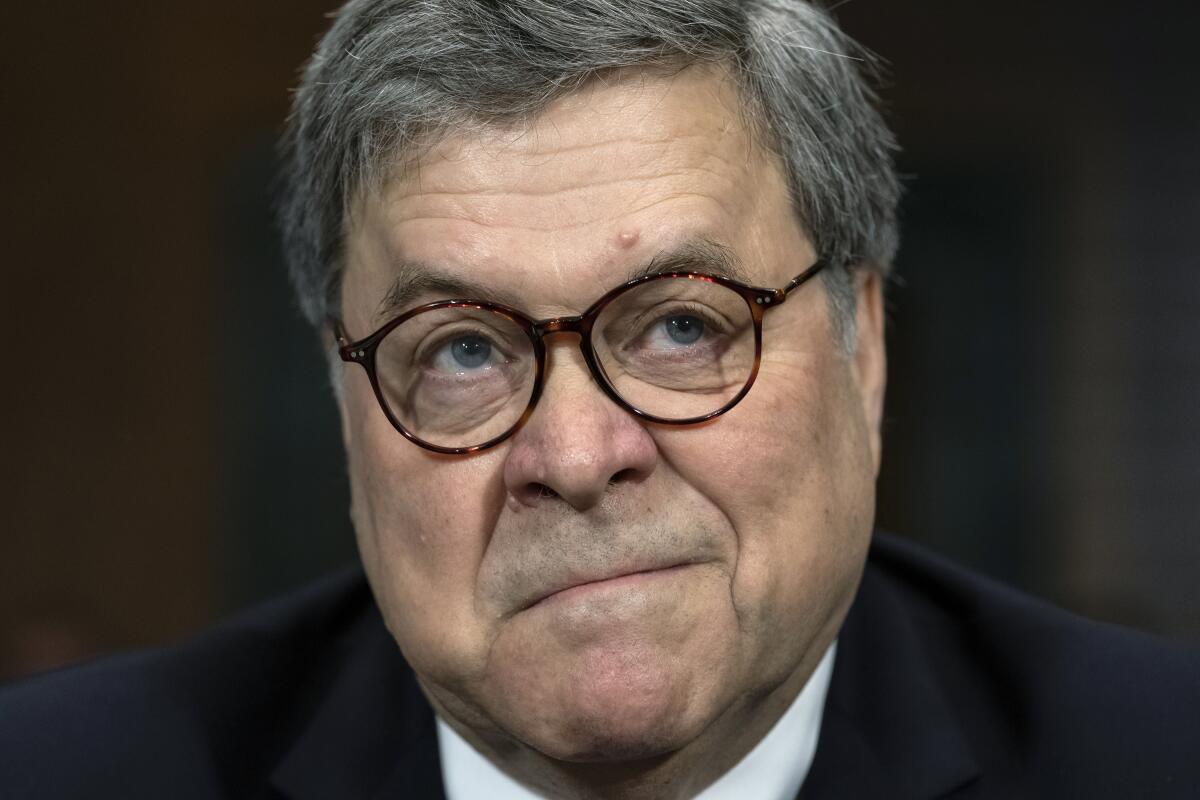Justice Department memo in 2019 attempted to rationalize lack of charges in Trump Russia investigation

- Share via
WASHINGTON — The Department of Justice has released a 2019 memo to then-Atty. Gen. William Barr advising him not to pursue obstruction of justice charges against then-President Trump related to the special counsel investigation into Russian interference in the 2016 election.
The memo by two senior Justice Department officials, which the Trump and Biden administrations both fought to shield from public view, states that Trump’s attempts to influence the investigation — including urging those in his circle not to “flip” on him, firing the head of the FBI and attempting to fire special counsel Robert S. Mueller III — did not constitute obstruction of justice because Trump thought the investigation was politically motivated.
The U.S. Court of Appeals for the District of Columbia Circuit ordered the Justice Department to release an unredacted version of the memo under the Freedom of Information Act. A version of the memo with more than half of its 10 pages redacted was released in May 2021 in response to a FOIA suit brought by watchdog group Citizens for Responsibility and Ethics in Washington.
The Justice Department argued in court that the document was exempt from disclosure and should be shielded from public view because it was produced in private deliberations by attorneys before a decision was formalized.
But the appeals court found that Barr never seriously considered charging Trump with obstructing the investigation, stating in its ruling that the memo Barr requested was an “academic exercise” and a “thought experiment.”
Mueller’s report listed 10 instances in which Trump’s actions while president could meet the requirements for an obstruction of justice charge. The special counsel’s office would have exonerated Trump if the facts had supported that conclusion, the report stated. But Mueller did not make a decision on whether charges should be brought, citing Justice Department policy that a sitting president cannot be charged with a federal crime.
Trump’s actions cited in the report included pressuring then-FBI Director James B. Comey to back off of an investigation into conversations between Michael Flynn, who was soon to be Trump’s national security advisor, and Russian ambassador Sergey Kislyak; firing Comey because he would not stop the investigation; and firing Atty. Gen. Jeff Sessions because he wouldn’t rescind his decision to recuse himself from overseeing the investigation.
The memo, written by Steven Engel, the former head of the department’s Office of Legal Counsel, and Ed O’Callaghan, then-principal associate deputy attorney general, states that Mueller’s failure to take a definitive position could be read to imply an accusation against Trump if the full report was released to the public, and that Barr should make clear that the Justice Department would not pursue charges. Mueller indicated in the report that because the Justice Department would not pursue charges against a sitting president, Congress should determine if Trump obstructed justice.
The memo advised Barr that the facts laid out in Mueller’s report were insufficient to establish that Trump had obstructed justice during the investigation, and that even if he were not president, the Justice Department should not pursue charges.
The memo argues that Trump took the actions outlined in Mueller’s report not because he was trying to cover up a crime, but because “he believed the investigation was politically motivated and undermined his Administration’s efforts to govern,” and states that most of the actions were “facially lawful actions that are part of the President’ s constitutional responsibility to supervise the Executive Branch.”
It also encourages Barr to take into consideration that none of Trump’s subordinates actually followed his orders to end the investigation or fire Mueller.
“Of course, it is true that an act may constitute an attempt or an endeavor, even if unsuccessful. But the facts that the President could have given these directions himself, and did not remove any subordinate for failing to convey his directions, weigh against finding an intent to obstruct justice,” the memo states.
The memo also states that Mueller did not find sufficient evidence to charge anyone in the Trump campaign with conspiring or coordinating with the Russian government to influence the 2016 election, and “it would be rare for federal prosecutors to bring an obstruction prosecution that did not itself arise out of a proceeding related to a separate crime.”
Justice Department officials also argued in the memo that the instances outlined in Mueller’s report were not similar to “any reported case” previously charged under obstruction-of-justice statutes.
“We conclude that the evidence described in Volume II of the report is not, in our judgment, sufficient to support a conclusion beyond a reasonable doubt that the President violated the obstruction-of-justice statutes,” the memo states. “Accordingly, were there no constitutional barrier, we would recommend under the Principles of Federal Prosecution, that you decline to commence such a prosecution.”
More to Read
Get the L.A. Times Politics newsletter
Deeply reported insights into legislation, politics and policy from Sacramento, Washington and beyond. In your inbox three times per week.
You may occasionally receive promotional content from the Los Angeles Times.











